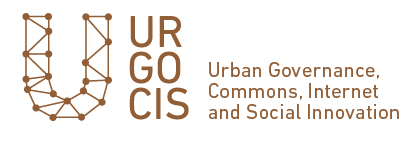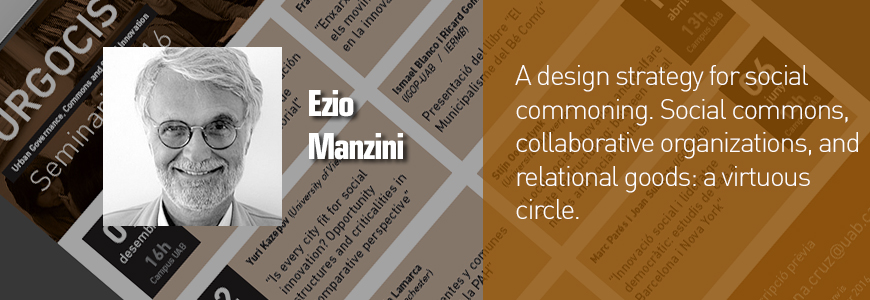Ezio Manzini (Professor Emèrit del Politecnico di Milano) participarà el proper 24 de novembre al cicle de seminaris URGOCIS amb la ponència “A design strategy for social commoning. Social commons, collaborative organizations, and relational goods: a virtuous circle”. El seminari tindrà lloc a l’edifici de l’IGOP en el Campus UAB. No es requereix inscripció prèvia. Per més informació: [email protected]
Ezio Manzini
For more than two decades he has been working in the field of design for sustainability. Most recently, his interests have focused on social innovation, considered as a major driver of sustainable changes, and on what design can do to support it. In this perspective he started and currently coordinates, DESIS: an international network of schools of design and other design-related organisations specifically active in the field of design for social innovation and sustainability (http://www.desis-network.org ).
In addition to his continuous involvement in the design for sustainability arena, he has explored and promoted design potentialities in different fields, such as: Design of Materials, in the 80s; Strategic Design, in the 90s (starting a Master in Strategic Design); Service Design, in the last ten years (starting the specific courses in Service Design).
Presently, he is Honorary Professor at the Politecnico di Milano and Guest Professor at Tongji University (Shanghai) and Jiangnan University (Wuxi).
His most recent book is “Design, When Everybody Designs. An Introduction to Design for Social Innovation”, MIT Press 2015. This book has been published (until now) in English, Spanish, Chinese and Korean.
A design strategy for social commoning. Social commons, collaborative organizations, and relational goods: a virtuous circle.
This paper presents the relationship between social commons and collaborative organizations, and discusses a design strategy aiming at improving the first (the social commons) thanks to conceiving developing the seconds (the collaborative organizations). More precisely, the idea is to use design tools and ideas to trigger a virtuous circle thanks to which collaborative organizations reinforce social commons, and social commons create an environment where collaborative organizations may thrive. The crucial point to make this virtuous circle happen is the quality of collaborative services. And, in particular, their ability to establish between involved actors a sense of trust, empathy and friendship. That is, their capability to produce those relational goods that, added up and connected, can produce social commons.
This paper conclusion is that design for social commoning practically corresponds to the one for collaborative organizations, when this design activity succeeds in defining a good balance between the search for solution effectiveness and the one for relational goods.
24 de novembre
16h Campus UAB
Sense inscripció prèvia
+ info: [email protected]
Informació subjecta a canvis
Darrera actualització: novembre 2016


